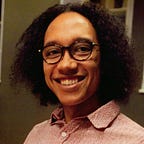Like Piece on Editor Edward Enniful
His prominence as a gay, black man hasn’t gone unnoticed.
A visit to the National Portrait Gallery to see Simon Frederick’s ‘Black is the New Black’ collection makes that clear. Of the 38 black figures men and women, across the generations, there are two gay black men. Only two.
To be black and gay is a racial group. To say something about gays and to say something about black gays is different. To discriminate against gays is one level of prejudice to discriminate against black gays is a different dual level of discrimination. The latter is racial and sexual prejudice.
Edward was one of two black people at the collection who moved me. The other, a black lady, Patricia Scotland, Secretary-General of the Commonwealth of Nations the first women to hold the office!
Since seeing it, I’ve wondered why Edward impressed upon me. He wasn’t the only gay black guy of the collection; he was the first in his field though.
I also think he moved me because on an emotional level because it’s not just racism and homophobia he’s likely to have faced, it’s elitism too. Racism intersects with other forms of bigotry here: homophobia and sexism.
Moreover, that’s the significance of him taking up the position as editor-in-chief of British Vogue magazine, as he is the first gay black gay man to hold the position.
“end the “white-out that dominates the catwalks and magazines”.”
A snippet from the collection’s description of Edward reads:
“[he] was named the new editor in chief of British Vogue, the first gay black man to hold the position.”
The first — gay — black — man.
Okay, I’m going on here, but I couldn’t understand why I fell so much to the point of a tear…
I’m not gay, I’m not particularly into fashion nor do I read Vogue. He’s a distant stranger. I don’t know him personally, in fact, I’ve never met him. Nor do I follow him on social media.
I think I felt so much because it’s a black connection; I don’t see a stranger I know a brother is overcoming despite everything the system of this country throws at us. In Edward’s case racism, homophobia and sexism — encoded into Britain’s DNA.
Moreover, given that every single national newspaper and significant magazine editor is white proves the point that he’s overcome some barriers. There’s talent as a result of publications overlooking the value of diverse teams. It’s sinful, and it’s stupid.
He’s a gay black man elite in his field. He said himself that he wanted to end the “white-out that dominates the catwalks and magazines.”
He is.
His first cover featured a woman of colour:
British model and activist Adwoa Aboah, with mag tagline: Great Britain.
Since him taking up the position the horizon has been changing and not just here but across the Atlantic too. Beyonce, the cover star of American Vogue’s September issue, was shot by an African American, Tyler Mitchell, the first ever in the magazine’s 126-year history.
The horizon has to change. A Guardian investigation last year revealed that there were whole months where not a single Black or Asian featured on the front cover of Britain’s highest selling magazines.
It’s not just the magazine industry it’s the film too. The myth that black movies ‘don’t travel’ seems prevalent in the magazine industry also. Black Panther, a movie with a predominantly black cast, debunked this myth as the highest grossing superhero movie of all time debunked this myth. I don’t believe this to be an exception; this reveals that black magazines can and will debunk the same tale in their own story in the future if given the chance and recognition.
Here’s to Edward 👏🏿 and the social circles he occupies
